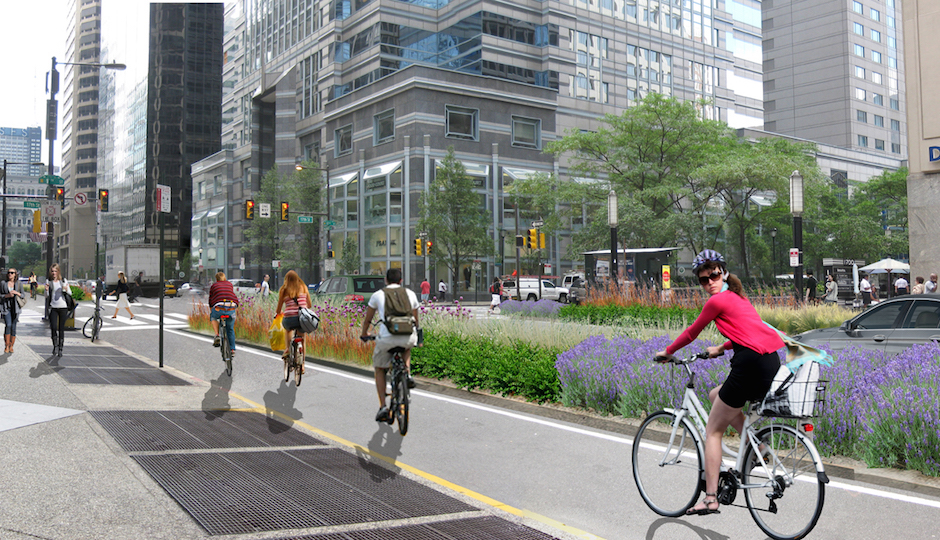Urbanists, Rejoice: Philly Is Getting Its First Complete Streets Commissioner

Market Street reimagined as more multimodal. | Image by Bryan Hanes and Parsons Brinkerhoff
Need proof of how far urbanists have come over the last few years? Mayor Jim Kenney is creating a brand-new position in his administration called the “Complete Streets Commissioner,” Citified has learned.
The National Complete Streets Coalition was founded more than a decade ago to ensure that roadways are not only designed for automobiles, but also for cyclists, pedestrians and transit users. Kenney spokeswoman Lauren Hitt says the Complete Streets Commissioner will be tasked with “making sure our streets are as multimodal as possible, including advocating for protected bike lanes.”
This is the same Jim Kenney who, as a City Councilman in 2009, introduced legislation to increase fines for bikers who ride with headphones. I don’t point that out to suggest Kenney is not genuinely supportive of the Complete Streets movement, but rather to show how much things have changed politically in the last few years. On the same day in ’09 that Kenney unveiled his proposal, then-Councilman Frank DiCicco introduced a bill to require cyclists to register their bikes with the city. In 2012, against the cries of the Bicycle Coalition of Greater Philadelphia, Council gave itself the power to veto bike lanes. “The entire ‘mobility’ agenda … has long provoked epic eye-rolls whenever raised with the city’s political class,” Patrick Kerkstra wrote on Citified last year.
And now? Bikers and urbanists are a recognized political constituency in the city, deemed deserving of virtually their own commissioner.
That doesn’t mean cyclists won’t disagree with Council ever again, but it does mean that they’ll show up to the battleground with more power. The Bicycle Coalition is a big part of the reason this shift has occurred. Last year, the group released a platform for mayoral and Council candidates, which included establishing a Complete Streets Office. It is also organized a mayoral forum, where every Democratic candidate said they supported the “Vision Zero” goal to put an end to traffic deaths.
Sarah Clark Stuart, executive director of the Bicycle Coalition of Greater Philadelphia, says she is “very heartened” that Kenney is adding a Complete Streets Commissioner to his staff. “We called for an Office of Complete Streets to be created,” she says, “so we’re very excited Mayor Kenney followed through.”
Along with advocating for more multimodal roads, Hitt says the Complete Streets Commissioner will implement what the Kenney administration is calling its “dig-once” policy, which seeks to cut back on the number of times that the city’s utilities rip up the streets. The idea, says Hitt, is that “when we have to dig for one project, let’s make sure we’re doing any other scheduled [or] needed work that would require tearing up the street at the same time.” The administration is still looking for candidates for the job.
Kenney is creating the position of the Complete Streets Commissioner at the same time that he is phasing out the Mayor’s Office of Transportation and Utilities. That may make some readers wonder if the Kenney administration is simply renaming MOTU, but that doesn’t appear to be the case.
Hitt says Kenney is eliminating MOTU as part of his shift toward a strong-managing-director form of government. Deputy Managing Director of Transportation and Infrastructure Clarena Tolson’s office “is the closest thing to a replacement for MOTU,” she says. “In this role, Clarena oversees Streets, Water, Complete Streets and interacts with related transportation and infrastructure agencies, like SEPTA, Philadelphia Energy Authority, etc.”
Stuart, too, says this is a “more than an office name change.”
“Creating a commissioner who is thinking about and looking at all transportation modes, and how to make them safer and work better for everyone, that is new,” she says. “And what that signals is that there is a dedicated, high-ranking official who is assigned the responsibilities to marshall citywide resources and set policy toward the goal of making Philadelphia’s streets safer for everyone.”